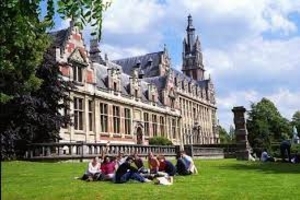Distance learning program of academic mobility with Belgium
Students of the Institute of Foreign Languages Elena Petrova and Anna Zhestkova (specialization “Pedagogical Education”, profile “French and English”) and teacher of the Department of German and French languages Khankevich Ekaterina Andreevna are finishing their studies at the Higher School of Translators of the Free University of Brussels.
The Higher School of Translation and Interpretation (ISTI), which has been part of the Free University of Brussels since 2015, trains future translators in 9 languages: Arabic, Chinese, English, French, German, Italian, Spanish, Turkish and Russian. Thanks to international recognition and 60 years of experience (ISTI was founded in 1958), the School has signed cooperation and mobility agreements with 110 universities in more than 30 countries.
The cooperation between PetrSU and the Higher School of Translators of the Free University of Brussels has been going on for many years. Last year, 3 students of the Institute of Foreign Languages Valeria Ananyeva, Anastasia Kuzmicheva and Nadezhda Ulyanova were able to complete full-time studies thanks to funding from the Erasmus + program . The coronavirus pandemic has closed all borders, but there is an opportunity to study remotely. Since February 2021, PetrSU students Elena Petrova and Anna Zhestkova and a teacher of the Department of German and French Languages at IIA Khankevich Ekaterina Andreevna have been studying the peculiarities of interpretation and translation from / into French, improve their knowledge of foreign languages and are now preparing to take exams.
Impressions of the current translator, teacher of the Russian language and an active participant in the cooperation of the two universities Nicolas Franks:
A year ago, when the pandemic hit the world, we all had to quickly adapt to new circumstances, and we started teaching on various online platforms with almost no experience in this area. Three students from PetrSU, who at that time were in Brussels with an Erasmus + grant, also had to adapt. Despite all the technical difficulties and the psychological burden of self-isolation, they attended classes with regularity and enthusiasm for the rest of the semester and returned home with all their credits. Well done! And this year there are also three girls on the exchange, but they found themselves in a completely different situation – they chose the six-month exchange, knowing that we are talking about distance learning. Of course, it’s a shame that we can only conduct classes and communicate through the screen. But all the same, the classes are going well, the motivation of the students is noticeable, as well as their progress! Of course, online courses will never replace face-to-face courses. Of course, they are not a substitute for language immersion. But nevertheless, the pandemic taught us one thing: even in international relations, modern technologies can provide us with additional or alternative solutions!
E.A. Khankevich, Lecturer at the Department of German and French Languages:
The opportunity to participate in the Erasmus program is priceless. In a distance learning environment, we can continue to gain new knowledge and hone our language skills. All classes are very rich and informative, information is presented in a structured and logical manner. I would like to note that the teachers of the Free University of Brussels are not only high-level professionals, but also wonderful people. The atmosphere in the class is always very warm and friendly. I thank Nadezhda Sergeevna Barymova and Nicolas Franks for the fact that today universities continue to cooperate, and students can continue to master the subtleties of the French language.

